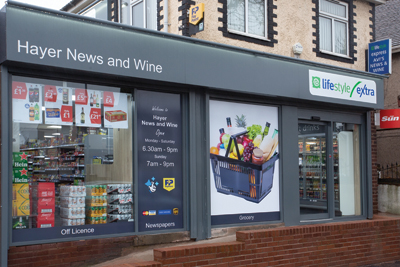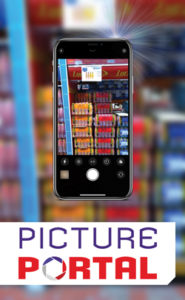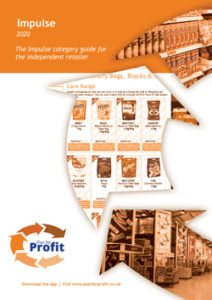Time to pull together: Darren Goldney of Unitas
Unitas managing director Darren Goldney (pictured) talks to Cash & Carry Management’s managing editor Kirsti Sharratt about the group’s first full financial year and the impact of COVID-19.
 The evening before Unitas’s trade show was due to start, Cash & Carry Management spoke to the group’s managing director Darren Goldney about having to cancel the event and the actions being taken to support members, both in relation to the Coronavirus outbreak and more generally.
The evening before Unitas’s trade show was due to start, Cash & Carry Management spoke to the group’s managing director Darren Goldney about having to cancel the event and the actions being taken to support members, both in relation to the Coronavirus outbreak and more generally.
As the Coronavirus situation worsens, how are you assisting your wholesaler members and their customers?
For our 172 wholesaler members, we are recommending that they follow government advice in terms of hygiene and trading.
For their retail customers, we are putting together a briefing document, advising them to make sure they signpost their services, range and availability – particularly of cleaning products, dry packaged groceries, etc – through Facebook, social media and consumer leaflets. We are also producing posters giving consumer advice for the retailers to display in store, and we are reminding them that consumers want to see good hygiene standards put into practice, such as regular cleaning of the surfaces of ATMs.
A lot of these retail stores serve some of the most vulnerable people in society, who perhaps don’t have the money to panic-buy even if they wanted to. Therefore we don’t want the retailer or the consumer to see any sudden inflation in pricing – which is a risk in times of shortage – so we are continuing to work with suppliers to ensure that we offer value in the form of business-to-business and business-to-consumer promotions.
The biggest worry of our wholesaler members and their customers is whether the multiple retailers will be given priority by suppliers. I am sharing stories of how independent retailers are going the extra mile to serve consumers, just to make sure our supplier partners understand that it might be an easy solution to send a full trunker to a multiple retailer’s warehouse but it might not be the best solution for getting product to the most needy.
For example, there was a report in The Independent about a Day-Today Express in Stenhousemuir giving people over the age of 65 in the local community free face-masks, antibacterial hand gel and cleaning wipes. Those unable to make it to the shop could even have a package delivered for free.
It seems that the multiples were hit hard by shoppers at the weekend, and consequently people are going to shops that they wouldn’t normally visit. We are getting a lot of reports today (16 March) of a significant rise in footfall in cash & carries too. We are asking suppliers and wholesalers to let us know if there are any issues with stock availability.
What about your foodservice members who might be seeing a decline in business at this time?
While some of our members service different types of customers and have seen a pendulum effect from foodservice to retail sales, some wholesalers who are primarily focused on foodservice have been affected.
For example, one of our members services cruise liners and obviously that’s not a great business to be in at the moment, so we are trying to operate as a conduit, connecting members that are over-stocked to those that are under-stocked. It could be that one foodservice specialist services pubs and restaurants and has had a decline in trade while another foodservice specialist services schools and hasn’t been hit because the schools are still open.
There is obviously a very healthy secondary wholesale network between members anyway, but we are in exceptional times, so we are even beginning to talk about how wholesalers might share products across channel boundaries – perhaps products for foodservice being turned into consumer-facing products for retail where legally labelled appropriately.
How much of a hit is Unitas taking by not being able to hold the trade show?
Our two big events – the trade show and the conference – are not profit generators. Staging the trade show is a big investment, but we are trying to replicate the benefits and give suppliers a return on investment by holding a virtual trade show. Members can shop the deals they would have been offered at the event; we are asking them to keep the two days free to talk to the suppliers.
You were going to deliver a progress report at the trade show. What are the key points you were going to highlight?
We have sent members and suppliers a virtual presentation with voiced commentary, which covers these key points:
• Our supplier partners reported an aggregated 4% sales increase (excluding tobacco) in 2019, and we have 330 supplier agreements (business plans) in place to drive growth.
• Our central services, whereby we negotiate a group rate on around 50 items such as credit card charges, fuel, uniforms, banking charges and electricity, have saved our members and their retail customers £750,000 in the past year. Around 70 of our members now take advantage of these central services – up from 50 last year.
• Unitas costs less to run than Today’s and Landmark separately, as we now have one office instead of two, and the money saved has been reinvested back into the membership against criteria like promotional execution and participation in our data programme.
For example, around 115 of our members with 130 depots are now using the Picture Portal tool to prove promotional compliance. This compares to 50 members with 80 depots when the scheme first started in April. For every depot that these members have, if they execute a promotion on day one to the right level, they earn a payment from the centre for each promotional cycle.
• More than 80 wholesaler member depots are now involved in the Plan for Profit core range programme, and they have generated over 90% compliance. In turn, more than 9,000 independent retailers are engaging with Plan for Profit across web and app.
• Around 4,000 retail stores (symbol and retail club) now participate in the Unitas retail promotional programme.
When will Brand Box, the NPD programme giving suppliers access to 1,000 stores at launch, start and what will it involve?
It will start in May. It offers a low-cost and effective way for suppliers to get their NPD into our symbol group stores (Today’s, Lifestyle and Day-Today). They will send free stock to a pick-up point, and we will split the cases, put the products into the retail stores, and use Picture Portal to show compliance.
 The third-party field sales force that we use will manage that process initially, but the long-term aim would be for the retailers themselves to use the Picture Portal. The benefit to our wholesaler members is that the retailers will use them to replenish their stock.
The third-party field sales force that we use will manage that process initially, but the long-term aim would be for the retailers themselves to use the Picture Portal. The benefit to our wholesaler members is that the retailers will use them to replenish their stock.
The Brand Box idea could also work really well in foodservice outlets such as cafés, so we will consider rolling out the initiative once it is established in retail.
Are you pleased with the response you have been getting from suppliers to the work you have been doing?
I’m really pleased overall. I think suppliers would commend us on the work we have done on Picture Portal; I think they would say we are making a much better job of having a chunky data service – we are offering insight on over £1 billion of sales data; and I think they would say we are best in class at communication, whether through our events or the supplier council.
At the same time, I think suppliers would probably want us to do more work on getting the right core range in the right environment. We send merchandisers in on a quarterly basis to site 50,000 pieces of point-of-sale material, and we are up to 90% compliance in the wholesaler depots, so now we are working hard to improve compliance of the core range recommendations in the retailers’ stores.
We are also highlighting products in our Take Stock magazine that are suitable for different types of out-of-home outlets – so we are making a start on core range in that sector too.
Is a perfect balance between supplier and wholesaler aspirations achievable?
The job of Unitas is quite difficult in that suppliers will always want, quite rightly, a higher return on investment with a greater ability to influence core range, new product development and promotional execution, and they see the role of Unitas to challenge our members to deliver those things.
Meanwhile, the members want suppliers to recognise the valuable role they play, and they feel that the levels of investment shouldn’t be predicated on too much conditionality.
The sweet spot for Unitas is for the members to be proactive in order to access the best investment level, and for the suppliers to acknowledge the progress being made (although they would like even more) and encourage us on the journey.
How well is the supplier scorecard working?
We focus on the top 40 suppliers and we issue their scorecards to our members quarterly (it used to be monthly but that was too frequent). At central office, we score them red, amber or green on supply chain, category support, financial administration and competitive investment programmes. There is a section for wholesale members to state if the suppliers’ performance differs locally.
In every meeting we have with those suppliers the scorecard is the first thing we discuss. Because it is not just about money, it gives the account manager more substance to talk about with other departments in their business.
In the future, we might broaden the scorecard scheme to other suppliers, and make it more bespoke to our wholesaler members according to which customer sector/s they operate within.
What is your key message to suppliers?
Around 99% of our members’ sales are of brands, and we want suppliers to reward that positioning. When you look at 10 of our key members, in 2019 they operated at an average of just over 1% net margin and were growing at just over 9.4%. By contrast, the top five national operators – Booker, Bestway, Costco, Bidfood and Brakes – which are much more own-label orientated, operated at just over 2% margin and were growing at just under 5% (The Grocer).
We are there to deliver what brand owners want but it is quite challenging to compete with the national operators as they appear to be getting a higher level of support. We are champion of brands and of independents, and if we can demonstrate better compliance – through Picture Portal, for example – surely we are earning the right to be given the same level of investment as the national operators?








